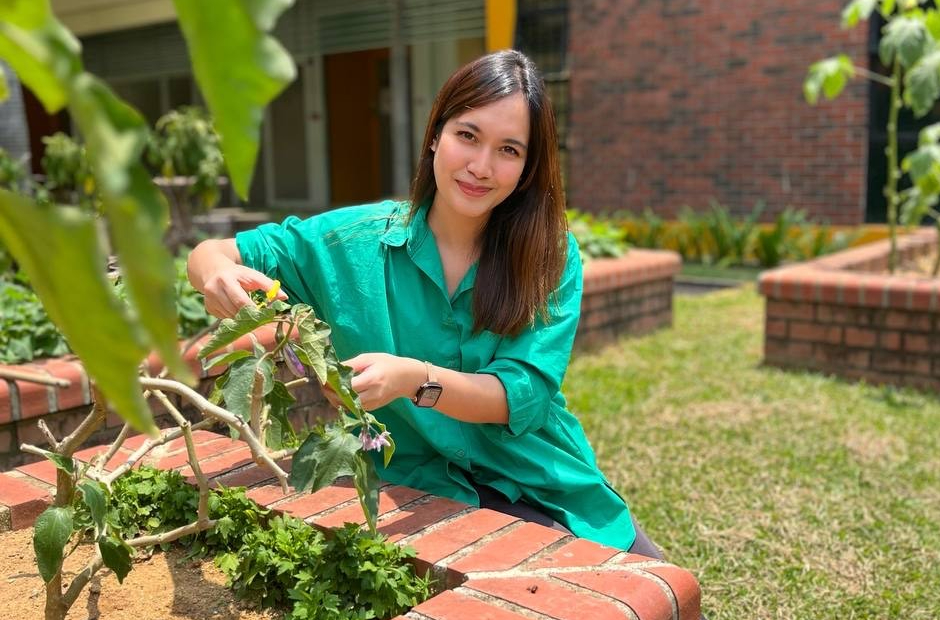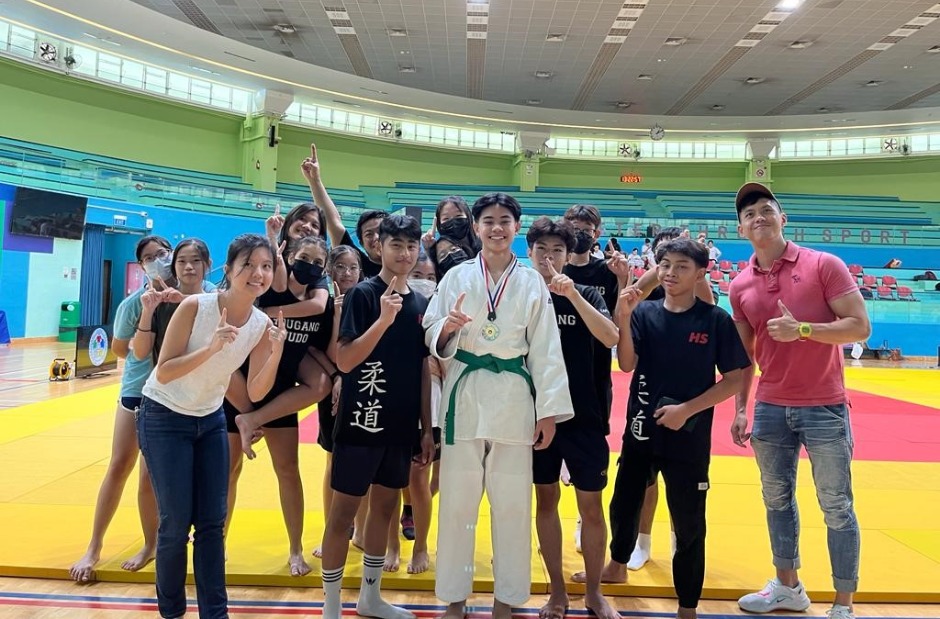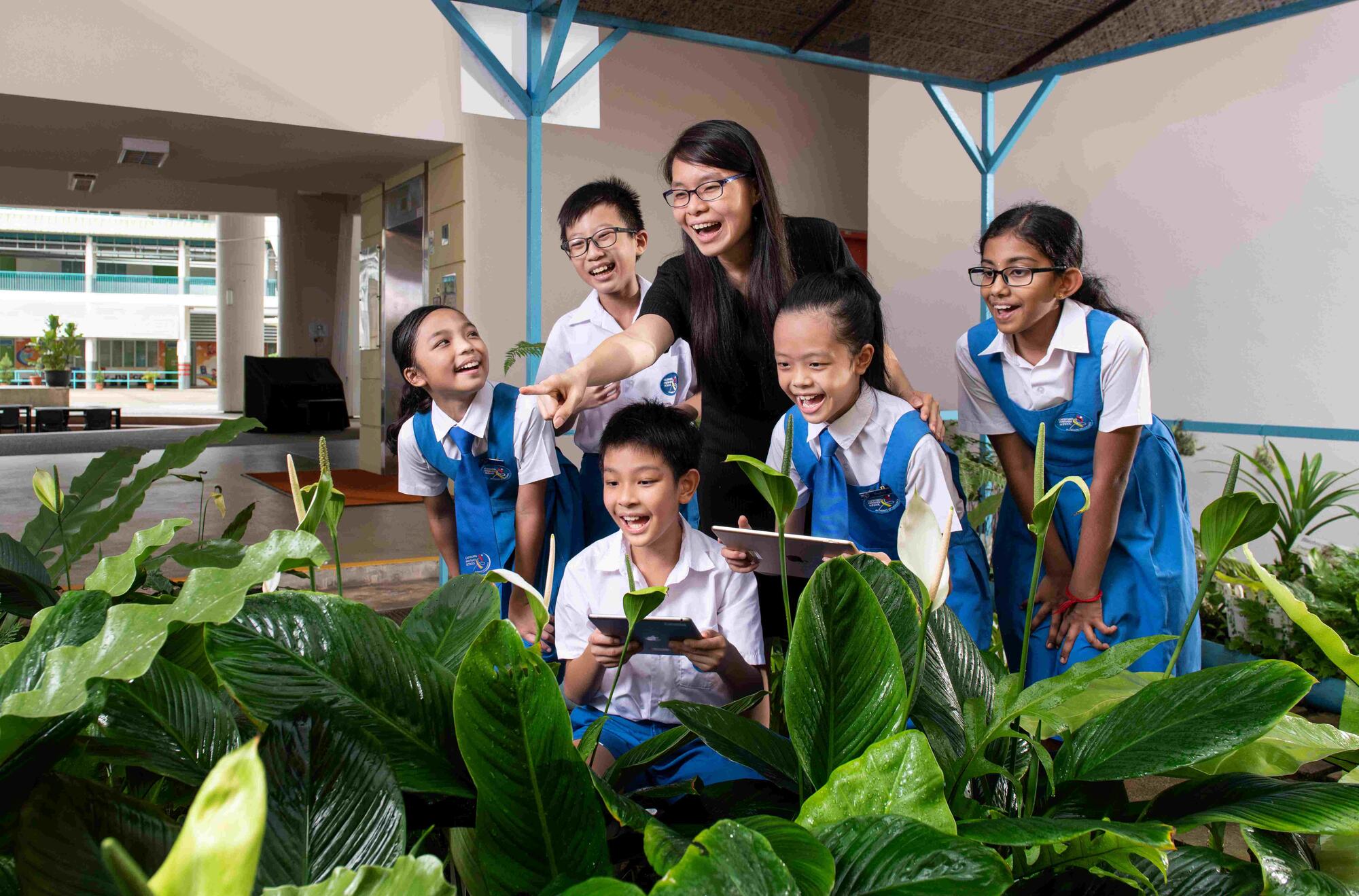Waste not, want not – How this teacher is tackling food waste, one lesson at a time
10 Oct 2023

Nutrition and Food Science teacher Ms Nurzatushuhadah Bte Mohamed Razif once peeked into the waste bins after a cooking lesson and was appalled by the amount of food wasted. Here’s how she encourages her students at Loyang View Secondary School to reduce food wastage and adopt more sustainable practices in school and at home.
By Owen Tan
When was the last time we mindlessly tossed out perfectly edible vegetable offcuts after preparing a meal or relied on single-use plastic containers to store food? In Ms Nurzatushuhadah Bte Mohamed Razif’s Food and Consumer Education (FCE) classes, such practices are a no-no.
The Nutrition and Food Science (NFS) teacher at Loyang View Secondary School is on a mission to educate students about the importance of reducing food waste and adopting more sustainable practices.
As part of the Singapore Green Plan, a comprehensive roadmap for sustainability in Singapore by 2030, one of the objectives is to strengthen green initiatives in schools.
“I felt that I had a part to play (in Singapore’s sustainability efforts), in my capacity as an educator as well as in my personal life,” she says.
Taking a small but crucial first step
One of the first things that Ms Shuhadah did was to reduce the use of single-use plastics in her personal life. She was among the early adopters of using tingkat containers to pack takeaway food. “The first few times I tried to pack food using my own containers at a hawker centre, the stall owners wondered what I was doing. Over time, I think such (eco-friendly) habits have caught on and it is now a common sight (to see people use reusable containers for takeaways),” she says.
In class, she encourages her students to do the same. They now use reusable containers, instead of plastic containers and Styrofoam boxes, to pack food that they prepare during FCE lessons. “I tell my students that we can start small to reduce our carbon footprint. If everyone commits to a small action, it all comes together to achieve something big for the environment,” she says.
Curbing food wastage was the other pressing issue that Ms Shuhadah tackled. As one of the teachers in charge of the NFS Food Lab pantry, she noticed that many ingredients had to be thrown away during stocktakes because they had expired.
“To address this, we stopped bulk purchases and only bought what we would be using for each practical session,” she shares. That meant that the NFS teachers had to come together to calculate the quantity of produce to purchase for each practical session while keeping tabs on the costs.
Despite their initial concerns that the prices of the ingredients would increase if they do not purchase in bulk, the teachers were able to keep the costs down, thanks to their collective efforts in sourcing for new suppliers. “Food portion control is one of the topics we teach in FCE, and we are proud to be able to put into practice what we have been teaching our students,” she says.

For Ms Shuhadah, pictured with her NFS colleagues (from left to right Mdm Li Jiayi Yvonne, Mdm Zubaidah Bte Mohd- Noor and Mdm Zahra Bte Mohamed Jailani), putting sustainability into practice in the classroom is a team effort.
Reducing food wastage
In class, Ms Shuhadah goes the extra mile to tackle food wastage. Once, she peeked into the waste bins in her school kitchen after a cooking lesson and was appalled by the amount of vegetable offcuts and food scraps that had gone to waste.
“Some students simply do not like vegetables and would not include them in the dish that they are cooking, even though they are part of the recipe,” she says.
Ms Shuhadah turned the incident into a learning opportunity. After challenging her students to find ways to reduce the amount of food waste produced during a practical lesson, Ms Shuhadah taught them to save the offcuts of vegetables, such as chives and celery, so that they could be replanted instead of discarded. The students learnt to trim the vegetables, soak the stems and roots in water and let the roots grow before planting them in the school’s vegetable plot.

Secondary 3 students replanting spring onion and celery offcuts that they saved from their Food and Consumer Education lessons.
Ms Shuhadah also started collecting eggshells after cake-making lessons so that they could be used as fertiliser in the school’s urban farm. In class, her students would wash the eggshells before returning them to her to be crushed and scattered in the vegetable plots. In this process, her students also learnt how eggshells can be beneficial for plant growth. Through their efforts, Ms Shuhadah and her students were able to cut food waste produced by half, from two trash bags to just one, during every lesson.

Eggshells are used as fertiliser in the school’s vegetable plots, which are maintained by Secondary 2 and Secondary 3 NFS students.
Doing their part for Singapore’s food security
Ms Shuhadah is also part of her school’s urban farming team that works with Secondary 2 and Secondary 3 NFS students to grow edible greens in the school’s vegetable plots. Students learn how they can contribute to Singapore’s food security while developing values such as resilience and responsibility. Through the initiative, the students also learn to appreciate where food comes from.
“When we first started (urban farming), my students complained that there was no shelter, it was too hot and that they came to school to study and not to water the plants,” shares Ms Shuhadah. But when her students started to see the plants grow and thrive under their care, they began to feel a sense of pride and achievement. Every year, the students harvest their produce and sell it at the school’s annual farmer’s market.

Students pack freshly harvested produce for sale at the farmer’s market.
At the farmer’s market last year, Ms Shuhadah worked with her Secondary 3 NFS students to curate a menu. Using fresh harvest from the school’s urban farm, they came up with attractive dishes including mango pudding and blue pea jelly, kaya buns and lime mocktails. Proceeds from the sale were donated to the Cerebral Palsy Alliance Singapore.

Mango pudding with butterfly pea jelly prepared using fresh harvest from the school’s urban farm.
To inspire her students to lead a more sustainable lifestyle, Ms Shuhadah also started her own indoor edible garden at home. Guided by YouTube tutorials and tips from colleagues from the urban farming team and Science department, she learnt to grow a variety of edible greens, such as spring onions, chilli, lemongrass and even oranges.
Every week, Ms Shuhadah would share her indoor farming successes and failures with her students, and that has spurred some students to start their own edible garden with their parents at home.
Through her actions, Ms Shuhadah wants her students to know that even the smallest step towards sustainability can add up to make a big impact. “I want my students to know that they have a role to play in contributing to Singapore’s food security and sustainability journey,” she says.

Ms Shuhadah started her own indoor garden in her kitchen to grow edible greens. Inspired by her, some students have also started their own edible garden at home.
More stories on environmental sustainability in schools:
The way of water – How sustainability lessons at school shaped this student’s career goals
There’s a rainforest in my school
We are on Telegram! Subscribe to our channel: https://t.me/schoolbag_edu_sg

.jpg)


.jpg)
